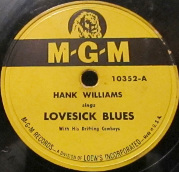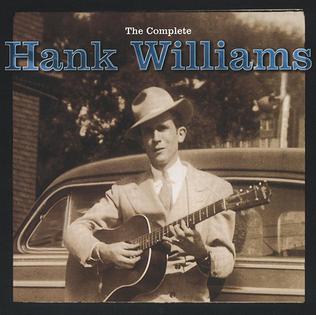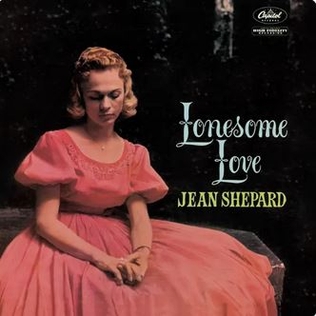Related Research Articles

"Your Cheatin' Heart" is a song written and recorded by country music singer-songwriter Hank Williams in 1952, later regarded as one of country's most important standards. Country music historian Colin Escott writes that "the song – for all intents and purposes – defines country music." Williams was inspired to write the song while driving with his fianceé from Nashville, Tennessee, to Shreveport, Louisiana. After describing his first wife Audrey Sheppard as a "Cheatin' Heart", he dictated in minutes the lyrics to Billie Jean Jones. Produced by Fred Rose, Williams recorded the song on his last session at Castle Records in Nashville, Tennessee, on September 23.
Country USA was a 23-volume series issued by Time-Life Music during the late 1980s and early 1990s, spotlighting country music of the 1950s through early 1970s.
"Have I Told You Lately That I Love You?" is a popular song written by Scotty Wiseman for the 1944 musical film, Sing, Neighbor, Sing and performed by Lulu Belle and Scotty. It was the greatest hit of Wiseman and his wife and one of the first country music songs to attract major attention in the pop music field. Its repeating fourth line is "Well darling, I'm telling you now." Although it was featured in the movie, it wasn't released by them until 1947. The first released version of this song was by Gene Autry in 1945.
"I'm So Lonesome I Could Cry" is a song written and recorded by American country music singer-songwriter Hank Williams in 1949.

"Lovesick Blues" is a show tune written by Cliff Friend and Irving Mills. The song first appeared in the 1922 musical Oh, Ernest. It was recorded by Emmett Miller in 1925 and 1928, and later by country music singer Rex Griffin. The recordings by Griffin and Miller inspired Hank Williams to perform the song during his first appearances on the Louisiana Hayride radio show in 1948. Receiving an enthusiastic reception from the audience, Williams decided to record his own version despite initial push back from his producer Fred Rose and his band.

"I Saw the Light" is a country gospel song written by Hank Williams. Williams was inspired to write the song while returning from a concert by a remark his mother made while they were arriving in Montgomery, Alabama. He recorded the song during his first session for MGM Records, and released in September 1948. Williams' version did not enjoy major success during its initial release, but eventually it became one of his most popular songs and the closing number for his live shows. It was soon covered by other acts, and has become a country gospel standard.
"I'm Old Fashioned" is a 1942 song composed by Jerome Kern, with lyrics written by Johnny Mercer.

The Complete Hank Williams is a 1998 box set collecting almost all of the recorded works of country music legend Hank Williams, from his first recorded track in 1947 to the last session prior to his untimely death in 1953 at the age of 29. While a number of live and overdubbed songs are excluded, the ten disc collection contains 225 tracks, including studio sessions, live performances and demos. Among those 225 songs are 33 hit singles and 53 previously unreleased tracks.
"Long Gone Lonesome Blues" is a 1950 song by Hank Williams. The song was Hank Williams' second number one on the Country & Western chart. "Long Gone Lonesome Blues" stayed on the charts for twenty-one weeks, with five weeks at the top of the Country & Western chart. The B-side of the song, entitled "My Son Calls Another Man Daddy," peaked at number nine on the Country and Western chart.

Sweet Relief II: Gravity of the Situation is a 1996 charity record that featured a variety of alternative rock bands covering songs written by quadriplegic musician Vic Chesnutt. Some of the artists were picked to give the album an international appeal to raise more funds for the Sweet Relief Fund, which assists musicians in need of health care.
"You Win Again" is a 1952 song by Hank Williams. In style, the song is a blues ballad and deals with the singer's despair with his partner. The song has been widely covered, including versions by Ray Charles, Jerry Lee Lewis, Roy Orbison, the Grateful Dead, Bob Dylan, and the Rolling Stones.

Lonesome Love is the second studio album by American country artist Jean Shepard. The album was released in December 1958 on Capitol Records and was produced by Ken Nelson. It was another album released by another central theme.
"Men with Broken Hearts" is a song written and recorded by Hank Williams under the pseudonym "Luke the Drifter." It was released on MGM Records in 1951.
"My Bucket's Got a Hole in It" is a song widely attributed to Clarence Williams, who obtained a copyright in 1933, although the melody was recorded under various names years earlier. The song became popular performed by Hank Williams for MGM and reached #4 on the country chart in 1949.

Hank Williams Sings is the debut album of country music singer-songwriter Hank Williams. MGM Records released the album on November 9, 1951.

By Request: More of the Greatest Live Show on Earth is a live album by Jerry Lee Lewis. It was released on Smash Records in 1966.
"I Could Never Be Ashamed of You" is a song written and recorded by Hank Williams. It was released as the B-side of "I'll Never Get Out of This World Alive" on MGM Records in November 1952.
"With These Hands" is a song written by Benny Davis and Abner Silver and performed by Eddie Fisher featuring Hugo Winterhalter and His Orchestra. It reached #7 on the U.S. pop chart in 1953.

Confessions of a Broken Man is a studio album by country music singer Porter Wagoner. It was released in 1966 by RCA Victor.
References
- ↑ Nielsen Business Media, Inc. (18 August 1962). Billboard. Nielsen Business Media, Inc. pp. 37–. ISSN 0006-2510.
- 1 2 "ultratop.be - Jerry Lee Lewis - Sweet Little Sixteen" . Retrieved 2020-04-23.
- ↑ Barbara Ching (19 July 2001). Wrong's What I Do Best: Hard Country Music and Contemporary Culture . Oxford University Press. pp. 85–. ISBN 978-0-19-028309-4.
The first, Jerry Lee Lewis's “How's My Ex Treating You” sounds very much like Lewis without a flashy piano.
- ↑ "How's My Ex Treating You by Hank Williams, Jr. - Samples, Covers and Remixes". WhoSampled. Retrieved 2020-04-23.
"Cover versions of How's My Ex Treating You by Jerry Lee Lewis". SecondHandSongs. Retrieved 2020-04-23. - ↑ Roger M. Williams (1981). Sing a Sad Song: The Life of Hank Williams. University of Illinois Press. pp. 108–. ISBN 978-0-252-00861-0.